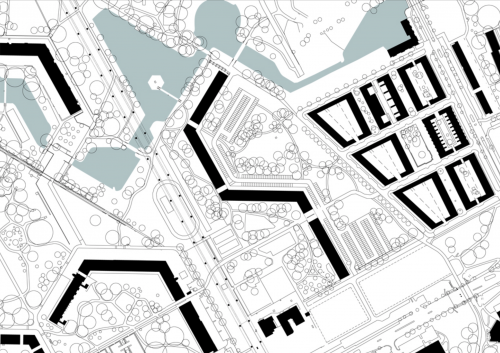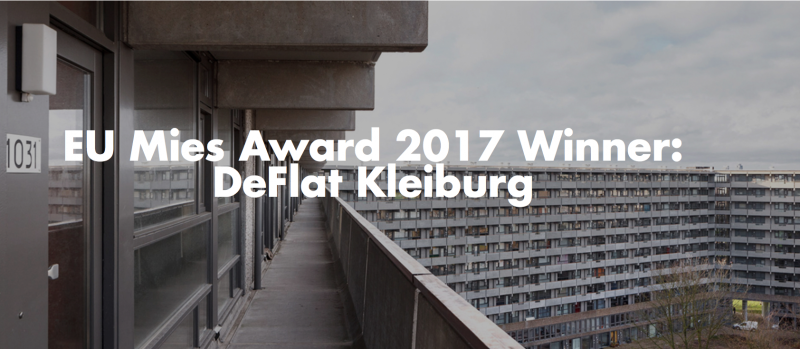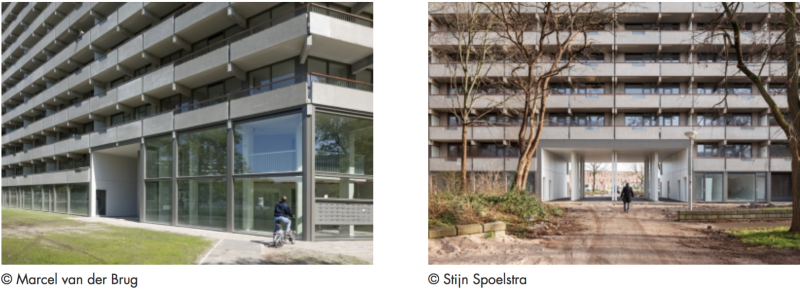EU Mies Award 2017 Winner: Renovation Bijlmermeer Apartments
DeFlat Kleiburg in Amsterdam by NL architects and XVW architectuur Winner Of The European Union Prize For Contemporary Architecture – Mies Van Der Rohe Award 2017
For the first time the main Award goes to a project of renovation of an existing building.
DeFlat Kleiburg in Amsterdam is the 2017 Winner of Prize. The architects are NL architects and XVW architectuur and the client Kondor WesselsVastgoed. DeFlat is an innovative renovation of one of the biggest apartment buildings in The Netherlands called Kleiburg, a bend slab with 500 apartmentsin Amsterdam’s Bijlmermeer neighbourhood. Consortium DeFlat rescued the building from the wrecking ball by turning it into a “Klusflat”, meaning that the inhabitants renovate their apartments by themselves.
The awarded project has been chosen from a list of 355 works from 36 European countries. Five finalists were selected and visited by the Jury: Rivesaltes Memorial Museum, Katyn Museum in Warsaw, DeFlat Kleiburg in Amsterdam, Kannikegården in Ribe and Ely Court in London, accompanied by the authors of the works, who also gave lectures open to the public.
DeFlatKleiburg
 The Jury valued that the project is a collective effort by many people. The architectural concept was to transform the megablock into a contemporary residential building with flexibility in internal planning, and creating a new edge to the street and the landscape – and yet do as little as possible. They considered it to be ‘both heroic and ordinary at the same time’. As the Jury Chairman said, “It challenges current solutions to the housing crisis in European cities, where too often the only ambition is to build more homes year-on- year, while the more profound question of what type of housing should be built goes unanswered. Kleiburg helps us imagine a new kind of architectural project, which responds to changing household patterns and lifestyles in the twenty-first century. A revitalisation of typologies of the past is as relevant as experimenting with new, untested models in this quest, just as radically transforming existing buildings is.”
The Jury valued that the project is a collective effort by many people. The architectural concept was to transform the megablock into a contemporary residential building with flexibility in internal planning, and creating a new edge to the street and the landscape – and yet do as little as possible. They considered it to be ‘both heroic and ordinary at the same time’. As the Jury Chairman said, “It challenges current solutions to the housing crisis in European cities, where too often the only ambition is to build more homes year-on- year, while the more profound question of what type of housing should be built goes unanswered. Kleiburg helps us imagine a new kind of architectural project, which responds to changing household patterns and lifestyles in the twenty-first century. A revitalisation of typologies of the past is as relevant as experimenting with new, untested models in this quest, just as radically transforming existing buildings is.”
The project inspires reflection on the new and complex reality of contemporary living. It proposes new forms of “affordable housing”, adding to what is universally a complex and multi-layered offer (ranging from fully subsidized rent to shared ownership and rent- purchase schemes) by providing options for the large majority who have a little money but cannot afford to get on the conventional property ladder. This is low-cost habitable space (€1,200 per m2) – a fantastic new option that does not currently exist.
Source: Miesarch.com





